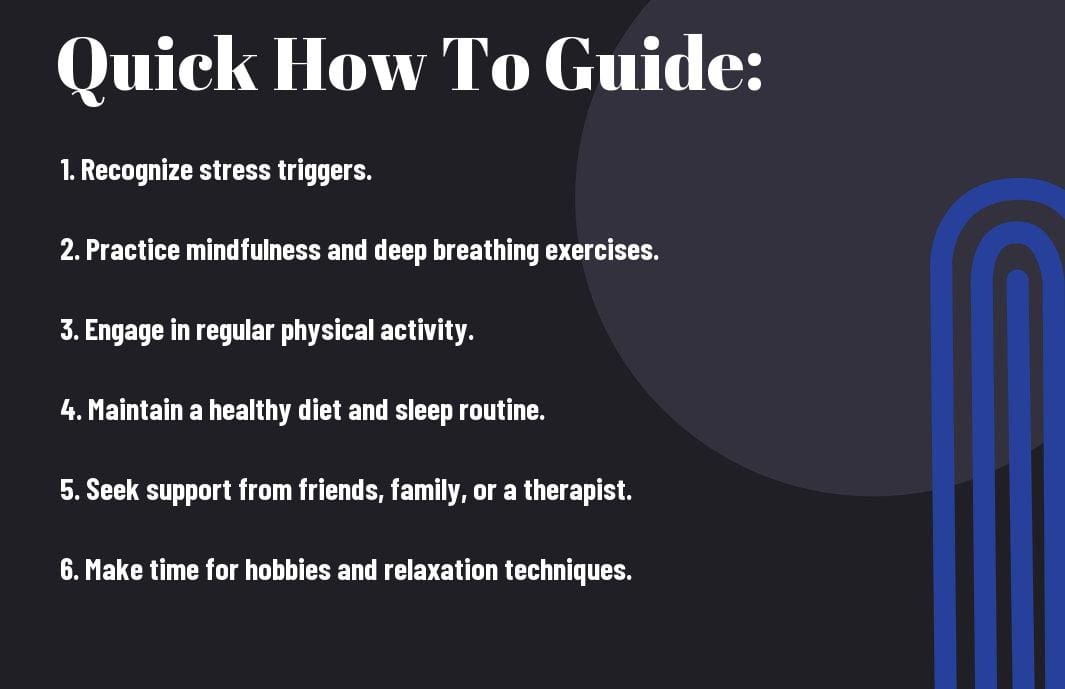Success in managing stress is critical for overall well-being and productivity. In today’s fast-paced world, stress has become a common denominator in many people’s lives, leading to physical and mental health issues if left unchecked. This comprehensive how-to guide aims to equip you with effective strategies to combat and reduce stress levels successfully. By implementing the tools and techniques outlined in this guide, you can build resilience and maintain a balanced lifestyle even in the face of adversity. Take charge of your mental health and well-being by mastering the art of coping with stress.
Key Takeaways:
- Recognize Your Stressors: Identifying the root causes of your stress is the first step towards effectively managing it.
- Implement Stress-Relieving Techniques: Developing healthy coping mechanisms such as meditation, exercise, or deep breathing can help reduce stress levels.
- Seek Support: Don’t be afraid to reach out to friends, family, or a mental health professional for support and guidance in dealing with stress.

Identifying Stress Triggers
Even the most seemingly minor events can trigger stress in our lives. Identifying these triggers is crucial in effectively managing stress. By recognizing what causes our stress, we can take proactive steps to address and mitigate it. This chapter will explore various strategies to help you identify and understand your stress triggers.
Personal Reflection and Journaling Tips
- Self-awareness: Spend time reflecting on your emotions and reactions to different situations.
- Daily journaling: Keep a journal to track your thoughts, feelings, and experiences throughout the day.
- Identify patterns: Look for recurring themes or events that consistently lead to stress.
Recognizing these patterns can provide valuable insights into the root causes of your stress. By documenting your daily experiences, you can gain a deeper understanding of your triggers and develop effective coping mechanisms.
Recognizing External Stress Factors
- Work environment: High workload, toxic coworkers, or unrealistic deadlines.
- Relationships: Conflict with family members, friends, or romantic partners.
- Financial pressures: Debt, job insecurity, or unexpected expenses.
Tips for identifying external stress factors include analyzing your surroundings and relationships. Assume that external stressors may not be immediately apparent and require careful observation to uncover.
Recognizing External Stress Factors
- Physical environment: Noise, clutter, or uncomfortable living conditions.
- Social influences: Peer pressure, social media expectations, or societal norms.
- Health challenges: Chronic illnesses, lack of exercise, or poor nutrition.
External stress factors can have a significant impact on our well-being. It’s imperative to identify and address these factors to prevent them from escalating. By recognizing the external sources of stress in your life, you can take proactive steps to minimize their negative effects.
How-To Implement Stress Reduction Techniques
Now let’s explore into practical strategies for implementing stress reduction techniques in your daily life.
Mindfulness and Meditation Practices
Reduction of stress can be achieved through mindfulness and meditation practices. Taking time to be present in the moment, focus on your breath, and engage in mindful meditation can help calm your mind and reduce the impact of stress on your body.
Incorporating Physical Activity for Stress Relief
Reduction of stress can also be achieved through physical activity. Engaging in regular exercise releases endorphins, which are natural mood lifters. Whether it’s going for a walk, practicing yoga, or hitting the gym, physical activity can help reduce stress levels and improve your overall well-being.
Practices such as yoga, tai chi, or even a simple daily walk can have positive effects on your mental and physical health. These activities not only help in stress reduction but also improve your overall emotional well-being. Making time for physical activity in your routine can be a game-changer in how you manage stress.
Cultivating a Support System
After recognizing that stress is affecting your well-being, it is crucial to cultivate a strong support system. Having a network of people who can provide emotional support, guidance, and practical help can significantly reduce stress levels and improve resilience.
Seeking Professional Help When Needed
Assuming you are feeling overwhelmed and unable to cope with stress on your own, it is important to seek professional help. This can include therapy, counseling, or consulting with a mental health professional who can provide tools and strategies to better manage stress and improve mental well-being.
Developing a Personal Support Network
On your journey to build a support system, developing a personal support network is vital. This network can include friends, family members, colleagues, or support groups who can offer a listening ear, empathy, and encouragement during challenging times.
Help can come in many forms, whether it’s a trusted friend offering a shoulder to lean on, a family member providing practical help with daily tasks, or a support group offering a safe space to share experiences and coping strategies. Having a strong personal support network can provide a sense of belonging, reduce feelings of isolation, and offer valuable perspectives and advice on managing stress.
Adapting to Life’s Stressors
Despite our best efforts, stress is an inevitable part of life. Learning how to adapt to life’s stressors is crucial for maintaining mental and emotional well-being. One key factor in adapting to stress is building resilience, which allows individuals to bounce back from challenges and setbacks.
Resilience-Building Tips
You can strengthen your resilience by practicing self-care routines, such as regular exercise, healthy eating, and adequate sleep. Incorporating mindfulness techniques like meditation and deep breathing exercises can also help reduce stress levels. Additionally, seeking support from friends, family, or a counselor can provide valuable resources for navigating tough times.
- Practice self-care activities regularly
- Incorporate mindfulness techniques
- Seek support from friends, family, or a counselor
This will help you develop the mental and emotional strength needed to overcome challenges and thrive in the face of adversity.
Embracing Positive Lifestyle Changes
Lifestyle plays a significant role in how we respond to stress. Embracing positive lifestyle changes can have a profound impact on our overall well-being. It’s necessary to prioritize activities that promote mental, physical, and emotional health.
It’s important to engage in regular physical exercise, maintain a balanced diet, ensure an adequate amount of sleep, and limit exposure to negative influences such as toxic relationships or unhealthy habits. Making these changes can enhance your resilience and help you combat stress more effectively.

Conclusion
Now equipped with a comprehensive guide on coping with stress, you have the tools necessary for success in managing and reducing stress levels. By implementing the strategies outlined in this guide, such as mindfulness, exercise, and seeking support, you can build resilience and take control of your well-being. Note, it is necessary to prioritize self-care and adopt a proactive approach to stress management. With dedication and perseverance, you can navigate through life’s challenges with ease and maintain a healthy balance in your daily life.
FAQ
Q: What is stress and how does it affect us?
A: Stress is our body’s natural response to challenges or threats. It can manifest physically, emotionally, and mentally, affecting our overall well-being. Chronic stress can lead to health problems such as high blood pressure, weakened immune system, and anxiety.
Q: How can I cope with stress effectively?
A: Coping with stress requires a multifaceted approach. Techniques such as deep breathing, mindfulness, exercise, healthy eating, and adequate sleep can help manage stress levels. It’s crucial to identify stress triggers and develop healthy coping mechanisms to deal with them.
Q: What are the long-term benefits of managing stress?
A: Effectively managing stress can lead to improved physical health, enhanced mental well-being, better relationships, and increased productivity. Learning to cope with stress can build resilience and empower you to navigate life’s challenges with a sense of control and confidence.




